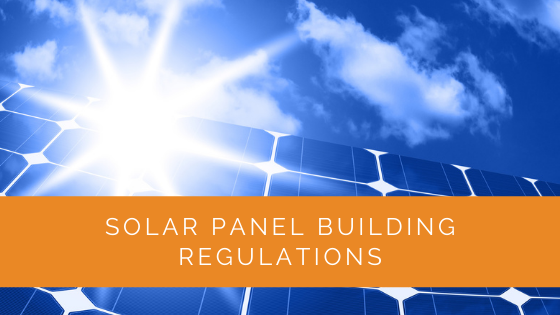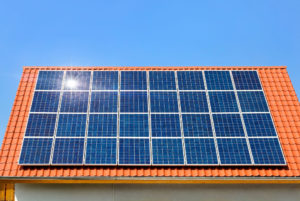When installing solar panels in your home, it’s essential to navigate the intricate web of building regulations in the UK. The Building Regulations 2000, born from the Building Act 1984, hold significant sway, particularly in England. These regulations prioritize the structural and electrical safety of your building when incorporating solar PV systems. Assessing your roof’s load-bearing capacity and ensuring the system’s electrical safety are paramount tasks, and failing to adhere to these regulations can lead to costly repercussions. This article aims to demystify the intricacies of solar panel building regulations, helping you harness the sun’s power efficiently and safely.
Navigating the regulations is a critical aspect of any solar energy project’s success, and it offers not only peace of mind but also ensures compliance with the law. With the guidance of certified installers and a solid understanding of these regulations, you can confidently embark on your solar journey, knowing that your solar PV system meets the required safety and compliance standards, contributing to a sustainable and energy-efficient future.
Contents
- 1 Key Takeaways
- 2 Do You Need Building Regulations for Solar Panels UK?
- 3 Do You Need a Building Warrant for Solar Panels?
- 4 Do you Require Planning Permission for Solar PV Installations?
- 5 What are the Things to be Considered Before Installing Solar Panels?
- 6 How Do I Calculate Solar Panel Requirements?
- 7 Case Study: Navigating Solar Panel Building Regulations for a Safe Installation
- 8 Expert Insights From Our Solar Panel Installers About Solar Panel Building Regulations
- 9 Discover the Power of Solar with Solar Panels Network
- 10 Wrapping Up
Key Takeaways
- When installing solar panels in the UK, it’s crucial to adhere to building regulations to ensure structural and electrical safety, with the weight-bearing capacity of your roof and electrical system being the primary concern. Using an installer certified by the Microgeneration Certification Scheme (MCS) is advisable to meet these regulations.
- Local authorities are responsible for checking compliance with building regulations for solar PV installations, and failing to follow these regulations can result in enforcement notices and fines.
- In most cases, you don’t need a building warrant or planning permission for solar PV installations on residential buildings in the UK. However, specific restrictions include not exceeding certain dimensions and complying with heritage and conservation area requirements. Commercial solar installations also have their own set of limitations.
Do You Need Building Regulations for Solar Panels UK?
When you plan to install solar panels at your home, getting acquainted with the standard building regulations becomes crucial. The Building Regulations 2000 were conceptualised under the Building Act 1984, applicable in England.
The prime factors of the regulation are structural safety and the electrical safety of the building while installing solar PV systems.
It is needed to monitor and supervise if your home’s roof can bear the weight of the solar panels, and the electricals of the system need to be safe. Based on the results, you may even have to make changes and alterations to fit in the solar panels for the safety of your house.
If you fail to follow the regulations, the repercussions could be even more exhausting. Hence, getting an installer registered and certified by the Microgeneration Certification Scheme (MCS) is advisable. Once the system is commissioned, you can use the certificates to prove that the installation follows the building regulations.

Local Authorities
Local authorities are responsible for checking if your solar PV installations comply with building regulation policies. However, whether a solar PV installation needs to notify the local authority seems unclear.
Planning to install solar panels without complying with the building regulations can severely impact your installation structure.
The local authority can serve an enforcement notice asking you to remove or alter the solar panel installation. Moreover, your local authority can even prosecute you in the Magistrate Court with a significant fee imposed on you.
Do You Need a Building Warrant for Solar Panels?
Generally, a building warrant is unnecessary for installing solar panels on your roof. It is the case if you stay in a two-storey or one-storey house.
A building warrant is not required if your existing roof structure can manage the weight of the solar systems and panels. However, in situations where you need to strengthen the roof of the house to sustain the weight of the panels, you may need a building warrant to install them.
Do you Require Planning Permission for Solar PV Installations?
Installing solar systems and panels on residential roofs is usually permitted. Hence, there is no need for planning permission or a local planning authority for installing solar PV panels or equipment in the UK.
However, there are still a few restrictions and limitations that you may need to know:
Residential Restrictions
- You should not install the solar PV panels above the highest part of your roof, which excludes the chimney. It should also not project out more than 20 cm from the ceiling or walls of your house.
- If your roof solar systems are broken and you are not using them anymore, you should remove them as soon as possible.
- People should think twice before installing giant solar panel systems on the roof. The main reason is that the installations shouldn’t have a massive impact on your building and should sustain the structure’s weight.
- If your house is within the grounds of the listed building, you may apply for an application for the listed building consent. You can also check with the local planning office if your property is assigned for a monument.
- If your house or property is built in a conservation area such as a World Heritage Site, the consent of the planning permission is needed to fit them to the elevation walls.
- The panels should generally be wall-mounted and not visible from the highway if the property is in a conservation area. You can even cross-check with your local planning office to monitor all the installations on your property and offer guidance.
Standalone Solar Installations
- The first standalone solar PV installation is allowed under the permitted development. For any more installations, you may need planning permission.
- The solar panel array size should not exceed 9 meters square or 3 meters wide and should be 5 meters away from the property’s boundary.
- The panels must not be installed higher than 4 meters from the ground.
- You must not install the solar panels within the diameter of the listed building or a scheduled monument.
- You can have only one standalone solar panel installation within the property.
- No panel part should be visible from the highway if the standalone installation is on the World Heritage Site.
Commercial Solar PV Installations
Most commercial solar installations below 1 MW are covered under the permitted development. However, below are a few limitations:
- The solar panels should be kept below 200mm perpendicular angle from the roof or the wall.
- The solar installation should be 1m away from the edges of the building.
- The ground-mounted solar arrays should not be more than 9 square meters in size and higher than 4m in height.
What are the Things to be Considered Before Installing Solar Panels?
If you wish to install solar panels on your roof, there are a few things you may have to consider before investing in them. Here are a few essential pointers you may have to think of before getting a solar panel for your home’s energy needs:
- Energy needs: Check your current electricity consumption to determine how many solar systems or panels you require.
- Roof: Before installing the solar panels, you should test and confirm if your existing roof can handle the weight of the solar installation. If the roof is old and weak, some strengthening work may be needed before installing the solar panels.
- Place: You should consider where you plan to install the solar systems. It could be your roof or garden or in a big commercial area.

How Do I Calculate Solar Panel Requirements?
Are you looking to conserve electricity or plan on saving money? What is your end goal in installing solar panels? Every house owner has a few crucial questions before installing a solar panel system.
Electricity production from solar panels has boomed in the UK and is expected to peak by the 2030s. Determining the size and number of solar panel systems you may need for your home energy requirements is crucial.
Here are a few aspects related to your requirements for solar panels:
- Your current energy requirements
- The number of watts you use at present
- The amount of sunlight your area receives
- Solar PV size and weight
Background
A family in Hampshire, keen on reducing their carbon footprint and energy bills, decided to install solar panels on their residential property. However, they were unaware of the detailed building regulations and potential legal complexities involved. The property, a two-story house in a conservation area, required special considerations due to its location and historical significance.
Project Overview
The primary objective was to install a solar PV system that maximised energy generation while ensuring compliance with the UK’s building regulations and local authority guidelines. The family needed guidance on structural safety, planning permissions, and legal requirements specific to their unique situation.
Implementation
- Initial Consultation and Site Assessment: Our team conducted a thorough site evaluation to assess the roof’s structural integrity and suitability for supporting solar panels. This included checking the roof’s orientation, shade, and pitch, which are crucial for optimal solar energy generation.
- Compliance and Permitting:
- Regulatory Consultation: We engaged with the local planning office to understand the specific regulations applicable to properties in conservation areas. This step was essential to ensure that the installation did not violate any aesthetic or structural rules.
- Documentation and Certification: We provided the family with all necessary documentation, including structural assessments and design plans, to apply for planning permission. The involvement of an MCS-certified installer was highlighted as it ensured adherence to the required safety and quality standards.
- Installation and Inspection:
- Secure Installation: The installation process included using non-invasive methods to secure the panels, ensuring no damage to the property’s historic structure. Special mounting systems were used to comply with conservation area requirements.
- Final Inspection and Certification: Upon completion, a final inspection was conducted to certify the installation met all building regulations and safety standards. The family received an MCS certificate, which validated the installation’s compliance and quality.
Results
- Regulatory Compliance: The project was completed with full compliance with the UK’s building regulations and local planning requirements. This ensured that the family avoided any legal issues or fines.
- Optimal Energy Generation: The solar panels were strategically placed to maximise sunlight absorption, considering the property’s unique constraints. This positioning ensured optimal energy generation, contributing significantly to the family’s energy savings.
- Preserved Aesthetic Integrity: The installation respected the conservation area’s aesthetic requirements, maintaining the property’s historical appearance while incorporating modern renewable energy solutions.
Summary
This case study underscores the importance of understanding and adhering to building regulations when installing solar panels, especially in sensitive areas like conservation sites. The family in Hampshire successfully navigated these regulations with our guidance, ensuring a safe and compliant solar panel installation. By working with Solar Panels Network, they were able to achieve their sustainability goals without compromising on legal or structural safety. This experience highlights the critical role of professional guidance and certified installers in navigating the complexities of solar energy projects.
Expert Insights From Our Solar Panel Installers About Solar Panel Building Regulations
Understanding and adhering to building regulations is crucial when installing solar panels. These rules ensure that your installation is safe, structurally sound, and compliant with local laws, which can prevent future legal and structural issues.
Senior Solar Consultant
Choosing a certified installer, preferably one registered with the Microgeneration Certification Scheme (MCS), not only guarantees compliance with building regulations but also assures quality and safety standards, providing homeowners peace of mind.
Certified Solar Installer
Regulations can be complex, especially in conservation areas or listed buildings. It’s essential to consult with local authorities early in the planning stages to avoid potential setbacks or costly modifications later on.
Project Manager for Solar Installations
Discover the Power of Solar with Solar Panels Network
Are you navigating the world of solar installations? Look no further than Solar Panels Network, the UK’s trusted partner in harnessing the sun’s potential. Our dedication goes beyond just installations; we’re on a mission to transform how homeowners and businesses across the UK perceive and utilise energy. By choosing us, you’re reducing your carbon footprint and making a smart financial move that promises savings for years ahead. Contact us today and embark on your solar journey.
Wrapping Up
For any solar energy project to succeed, specific regulations and compliances must be followed to safely and efficiently use the equipment. It is vital to know and understand the different aspects and rules around installing photovoltaic systems for houses in the UK today.
A clear understanding of the regulations would let you enjoy a certified usage of solar PV systems without going against any law. Building regulations also offer maximum safety and compliance to the citizens who wish to invest in solar PV systems.
With the guidance of knowledgeable installers, you can expect the safest installation of solar PV panels that comply with your state’s standard building regulations.
About the Author
Solar Panels Network stands at the forefront of solar energy solutions, driven by a team of seasoned solar engineers and energy consultants. With over decades of experience in delivering high-quality solar installations and maintenance, we are committed to promoting sustainable energy through customer-centric, tailored solutions. Our articles reflect this commitment, crafted collaboratively by experts to provide accurate, up-to-date insights into solar technology, ensuring our readers are well-informed and empowered in their solar energy decisions.


